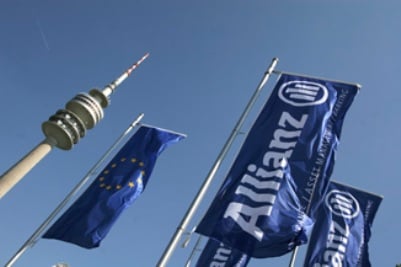Ratings for Allianz Life Insurance Co. of North America and Aviva Life and Annuity Co. have been placed on review with negative implications by A.M. Best Co. Inc. due to their parent companies' exposure to the eurozone crisis.
The moves show that Europe's overall negative outlook and carriers' exposure to sovereign debt can still have an adverse impact on otherwise strong subsidiaries on this side of the pond.
Aviva's parent in the United Kingdom, Aviva PLC, has investment exposure to a number of eurozone economies, namely Italy, according to the ratings agency. Meanwhile, German carrier Allianz SE has sovereign-credit exposure to several European nations.
Notwithstanding analysts' concerns about Europe, the carriers' U.S. subs hold strong ratings. Specifically, Allianz Life's financial strength and issuer credit ratings were affirmed at A and a+, the second- and third-highest ratings, respectively. Aviva's ratings are also A for financial strength and a+ for issuer credit.
“We had affirmed the credit profile of Aviva's U.S. operations, but this was a concurrent impact that affected them because of an analysis of its exposure to its parent,” said Thomas Rosendale, assistant vice president of A.M. Best. He covers Aviva Life.
Many U.S. units of European insurers receive a ratings enhancement because their parent companies tend to be larger, stronger and more diversified than their U.S. counterparts, Mr. Rosendale said. European insurers tend to keep a lot of capital at the parent company level, too.
Nevertheless, that same ratings enhancement can work to U.S. subsidiaries' disadvantage, as their ratings will move in lock step with those of their parents. “The U.S. operations' ratings will follow the parents' ratings, so if there were a downgrade [on the parent], there would be a direct impact,” Mr. Rosendale said.
RELATED ITEM Advisers' favorite VA providers »
U.S. subsidiaries of European companies aren't necessarily at a competitive disadvantage based solely on their parents' issues with the eurozone crisis, as distributors and policyholders stateside view the subsidiaries as being separate from their parents, analysts observed.
The exception, however, would be in the event of an actual ratings downgrade, said Rosemarie Mirabella, managing senior financial analyst, at A.M. Best. She covers Allianz Life.
“The caveat is if there's a downgrade,” she said, “but we don't see that happening in the near term unless there's significant deterioration at the parent company or if the U.S. environment — which has improved slightly — starts to trend negatively.”
The U.S.-based subsidiaries of Aviva and Allianz themselves generally are viewed positively. Aviva's strengths include its risk management practices and investment portfolio, while analysts cite Allianz's revenue growth and investment returns as positives for the insurer.
On the downside, Allianz is hindered by higher reserve requirements on its legacy variable annuity block, while Aviva has a “heavy” liability and new-business concentration in indexed annuities and life, according to A.M. Best.
Kevin Waetke, a spokesman for Aviva, said that “the announcement by A.M. Best is consistent with the actions taken by other rating agencies and reflects the challenging environment facing many banks and insurers with operations in Europe."
"Aviva is focused on our balance sheet strength and we remain on track to meet our financial targets this year,” he added.
Allianz spokeswoman Sara Thurin Rollin could not be reached by press time.







